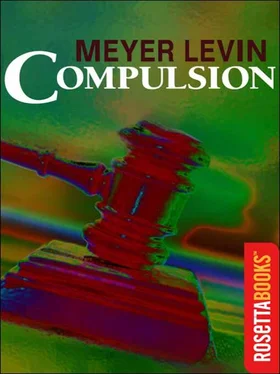“No, I didn’t-” Horn began.
Wilk cut in, a figure of wrath. “Why, every lawyer in Chicago knows you had an alienist testify that Fitzgerald was a legal moron!”
“Yes, but I didn’t permit testimony of insanity!” Horn screeched. “Moral depravity is not insanity.”
“An alienist testified to the mental condition of Fitzgerald,” Wilk insisted.
“Testified he was a degenerate!”
“And irresponsible!” Wilk shouted in his face.
“And Fitzgerald was sentenced to be hanged!” Horn retorted triumphantly.
“You hanged him,” Wilk stated, in disgust. “You hanged a diseased moron.”
Judge Matthewson angrily rapped for order. For another day they debated, until Padua summed it up for the State: “Seventy per cent of all admissions to state institutions are mental diseases functional in their nature – the very language of the defence – and that is insanity, legal insanity, and that is a defence before a jury.”
Now Wilk ranged himself in his famous pose, his thumbs under his braces, his long body relaxed.
He began dryly. “I understand from everything that has been said in this case, from the beginning to the end, that the State’s Attorney’s office feels the universe will crumble unless these two boys are hanged. I must say I have never before seen the same passion and enthusiasm for a death penalty as I have seen in this case.”
It was Wilk in one of his characteristic humanitarian outbursts. “If I thought that hanging men would prevent any future murders, I would probably be in favour of doing it,” Wilk said. “In fact, I would consent to having anybody hanged, excepting myself…”
Now he became the clever lawyer, turning Horn’s own argument against him. “If the ability to judge between right and wrong is the only criterion of sanity, why, then we already know the boys are legally sane, so the judge can listen to anything he wants, here. Why, Mr. Horn even said my clients are as sane as he is!” What, then, was the prosecution holding things up for? “They came in here with their beloved Blackstone, hoary with time…”
Horn shook his head as if to say, Let the clown have his act.
“We have in this state a statute which says the court, before he passes sentence on a human being, may inquire whether there are mitigating circumstances. Now what does this mean? Is there any catalogue? No, the court must tell, it is for him to decide and no one else.
“What is a mitigating circumstance? Youth itself. Simply because a child hasn’t judgment. Why, we’ve all been young and we know the vagaries of the mind of a child. We know the dream world it is in; we know that nothing is real. These two boys are minors. The law forbids them making contracts, from marrying without their parents’ consent. Why? Because they haven’t judgment, which comes only with years. I can’t understand lawyers who would talk of hanging boys as they would talk of a holiday – as they would talk of the races.
“About seven years ago, a poor boy named Petnick was charged with murder and I was asked by a charitable organization to defend him. He went to a house one day to deliver groceries and picked up a knife and killed a mother and her baby.
“I entered a plea of guilty, as in this case. I called his school teacher to show his mental condition, and I called alienists to prove the state of that poor boy’s mind. Judge Willard, a former partner of Mr. Horn here, said he would not hang that boy. And yet in this courtroom today we are told that the court may not consider such a circumstance!” He gazed reproachfully at the prosecution. “They say that’s the law – you are told you can’t even hear this testimony in mitigation. If that’s the law, I trust this court will ignore it, as the courts do ignore it constantly!”
Horn exploded. “In the name of the women and the children of this state,” he screamed, “I ask Your Honour whether this has ceased to be a court of law! Mr. Wilk tells Your Honour to ignore the law, to bum the criminal code!” He glared at the forgotten Dr. McNarry, the cause of the two-day argument. “You would indeed have to disregard the law, to hear this witness!”
With a brusque movement, the judge made his decision. “Under the wording of the statute I must hear evidence in mitigation and evidence in aggravation. The objection of the State is overruled, and the defence may proceed.”
Judd and Artie were alight, as though all had been won.
What could Dr. McNarry tell? Why had the State’s Attorney fought for two whole days to keep out his testimony?
McNarry began with Artie, detailing how the habit of lying evolved until “he himself says that he found it difficult to distinguish between what was true and what was not true.”
Horn broke in: “I submit that we are getting now clearly into an insanity hearing and I move that a jury be empanelled.”
“Motion denied,” said the judge.
McNarry came to the fantasy life, and Horn tried the other tack. “This condition you have described is sometimes called building castles in the air, is it not? Is that not quite common among boys?”
“Surely,” the alienist agreed. “But air castles are generally considered to be something beautiful and desirable, while these-”
“Don’t most boys have daydreams about dungeons and escapes?”
Judge Matthewson said stiffly, “Let the doctor proceed without interruption; cross-examine when he gets through.”
The doctor described the shadowing in the street, the jail fantasy, and how when Artie finally got into jail he “felt as if he belonged there and was living out in reality what he used to picture to himself as a child”. He told of the curious “continuance into his present life of a practice he had as an infant, confiding in his teddy bear, ‘And now, Teddy…’” He summarized: “Whereas fantasy life is compensatory, it also foreshadows our real conduct. He thinks of himself in prison, as a master criminal. The significance is on the emotional side because it is in the emotions that the fantasy life has its roots.” Artie was remaining, then, emotionally a child, a bad child seeking punishment.
To show how fantasy imposed itself and could even obliterate reality, the psychiatrist reminded us that despite Artie’s genera! popularity everywhere, Artie had an idea of himself as unwanted and inferior. This was another sign of Artie’s disintegration, as was his complaint that in the last few years he had felt that he “wasn’t all there”.
“In other words, he has grown to eighteen years of age, but he has carried his infancy with him in the shape of an undeveloped emotional attitude toward life… We see a complete derangement, a complete personality split where there is no longer the possibility of bringing the two aspects of the personality into sufficient harmonious union. Artie is in a stage which is capable, if it goes further, of developing that malignant splitting.”
Would Dr. McNarry discuss the other crimes, A , B , C , D , as further evidence of Artie’s disintegration?
“Artie’s tendency was criminalistic.” But he listed only the minor crimes, already well known. “To fulfill his mastermind fantasy, Artie needed a gang, and Judd was his gang. Now Judd had no fundamental criminalistic tendency.”
This statement in itself startled the courtroom.
Judd’s tendencies, the doctor said, could be expressed as a constant swing between feelings of superiority and feelings of inferiority. He needed a complement, a balance, and had attached Artie as his other ego, sometimes superior, sometimes inferior, as when the king was rescued by the slave.
“Thus, in this fantasy, in either position he occupies, as king or as slave, he gets the expression of both components of his make-up, his desire for subjection on the one part and the desire for supremacy on the other, so that with their effective and emotional relationship to each other, each entire life plays into the other with almost devilish ingenuity, if I may be permitted to use the term.”
Читать дальше












